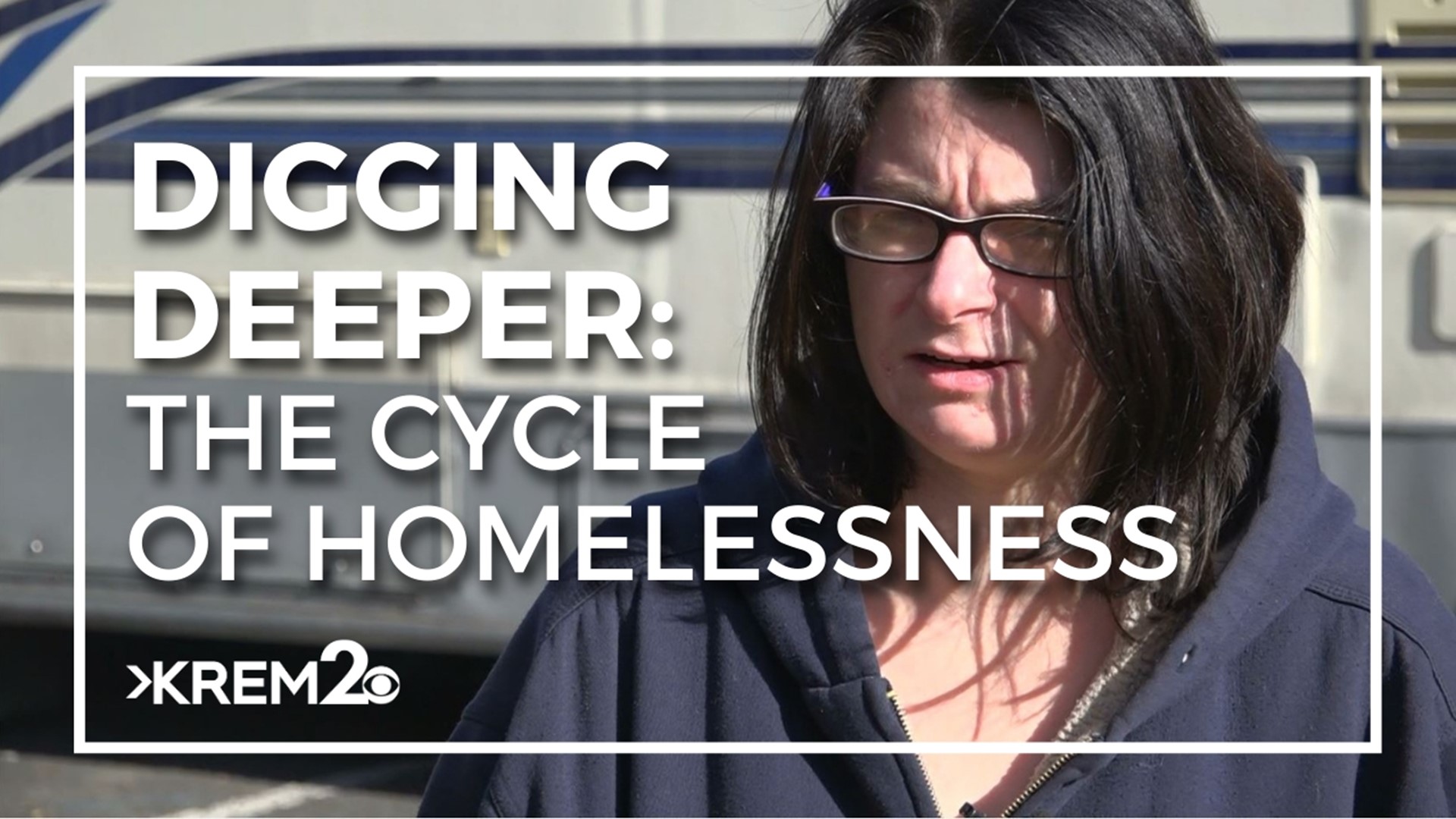SPOKANE, Wash. — The way a person becomes homeless is unique, but what isn’t unique is the struggle of getting out of homelessness.
Catholic Charities of Eastern Washinton Senior VP of Advancement and Impact Kelly Keenan said this requires a support system that can adapt.
"We know that our community needs a variety of different pathways for folks out of those challenging situations," Keenan said. "We intend for these projects that includes a variety of temporary and permanent housing options that are staffed and designed very intentionally."
Catholic Charities' The Catalyst is one of Spokane's newest transitional housing option. It has been helping people move from the homeless encampment off of I-90 and Freya into more stable housing.
"We really see Catalyst as this kind of emergency housing scenario that provides temporary stability for folks to really engage them in the services that they need for that longer term independence in the community," CCEW Chief Stabilization Officer Dawn Kinder said.
Kinder said Catalyst uses an individualized-approach to target the needs of its participants.
"They're in control of when they feel like they're able to support themselves and move out, we're certainly encouraging people to make choices that promote that long term stability, but also honoring where they are in their journey and being there to support them until they are also confident that they're ready to move out," Kinder said.
It was an opportunity that encouraged Joelle Fitzpatrick and her boyfriend to apply. Fitzpatrick said she became homeless summer 2022 and lived at the homeless encampment off of I-90 and Freya before transitioning into the Catalyst Project.
“It seemed like a way out of Camp Hope,” Fitzpatrick said.
She said the program had a lot to offer.
"Three meals a day," Fitzpatrick said. "They were pretty good. There’s care providers for each floor, bus passes, whatever we asked for.”
Even with all she enjoyed, there were some adjustments she said were hard to accept.
"The security bullying the homeless people, like they’re lesser than,” Fitzpatrick said. “People kept threatening full body searches and stuff. Made us feel like we were in jail."
When asked if that was what she signed up for, Fitzpatrick replied, "No. We signed up for help."
CCEW declined to talk about the specifics of Fitzpatrick's exit, but did provide data on how many people have been through the program.
Since opening, CCEW reports 10 people have exited the project, 4 transitioned into permanent housing and 6 voluntarily decided the program wasn't the right fit for them. 17 people were asked to leave because "they weren’t ready or willing to adhere to our participant expectations, which are in place to ensure and promote community safety and health," Keenan said in an email. At the time of this report, Keenan said all 89 spots at Catalyst are full.
"Sometimes it does mean that we have to part ways with a participant and say, 'hey, you know, you're not making the right choices right now for this environment. And when you're ready to try again, please let us know,'" Kinder said.
So, the cycle of homelessness begins again for Fitzpatrick and her boyfriend.
Spokane homeless service providers say this is what makes the crisis so complex.
There is no one size fits all solution.
Lerria Schuh is the executive director of the Smith-Barbieri Fund. Schuh said her job is to support the non-profits that are working to meet individualized needs.
“We’ll never actually solve homelessness but we can manage it better," Schuh said. "We can provide better resources for people who are experiencing homelessness and all the complexities that led to it and getting out of it.”
“It's just things that happen to people in vulnerable situations that they're at no fault for," Kinder said. "They are responsible for the decisions they make going forward and how they engage with services to get to that place where we can say, 'hey, you've totally killed it, let's help you get an apartment,' or unify you with your mom, or whatever that next step is.”
Kinder said CCEW knows Catalyst isn’t right for everyone.
She said if the program isn’t working, participants can leave and later re-engage.
“They can appeal a decision to come back," Schuh said. "So there's lots of opportunities beyond that decision being made for somebody to re-engage with us."
Fitzpatrick said she has not been in contact with Catholic Charities since she exited at the end of January.
So for now, she said she's back on the streets and living out of her RV until she’s ready to get help and try another way to break the cycle.
“Surviving, trying to find a shower, gas, changing locations day to day,” Fitzpatrick said.
Fitzpatrick said she has not gotten help from another homeless resource since she exited Catalyst at the end of January. She said she hopes to get a stable income so she can park her RV on a lot.
DOWNLOAD THE KREM SMARTPHONE APP
DOWNLOAD FOR IPHONE HERE | DOWNLOAD FOR ANDROID HERE
HOW TO ADD THE KREM+ APP TO YOUR STREAMING DEVICE
ROKU: add the channel from the ROKU store or by searching for KREM in the Channel Store.
Fire TV: search for "KREM" to find the free app to add to your account. Another option for Fire TV is to have the app delivered directly to your Fire TV through Amazon.
To report a typo or grammatical error, please email webspokane@krem.com.

